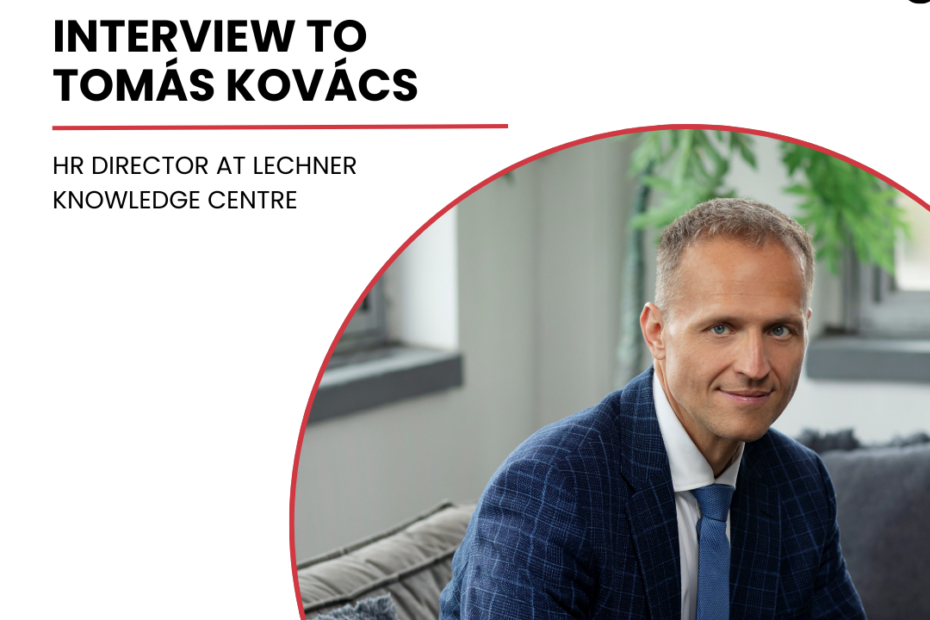HR is no longer what it used to be: pushing papers, posting job ads, and processing payrolls. In the 21st century, human resource management has become a strategic game where the winners are those who can simultaneously digitalise, ensure sustainability, and create a people-centred corporate culture. But how do the best achieve this? We spoke with Tamás Kovács, HR Director of the Lechner Knowledge Centre, to find out.
A New Strategy for HR: Digitalisation and Sustainability in Focus
“When an organisation evolves digitally, HR must follow suit,” says Tamás, who has closely witnessed how digitalisation is reshaping the world of HR professionals. “We have been heavily digitalising HR processes for three years, fundamentally transforming our operations. In the past, an approval process could drag on for two months – today, it takes just half a day. This is not just a matter of convenience but a survival strategy.”
Sustainability is another essential piece of the HR puzzle. ESG, employee well-being, corporate social responsibility – these are no longer just buzzwords in glossy brochures but essential elements shaping the daily lives of HR leaders. “Being a ‘nice’ HR professional is no longer enough. One must know how to create a workplace where employees feel mentally and physically secure in the long term.”
Sustainability is not only about employee well-being but also about corporate responsibility. “HR must be able to link sustainability goals with corporate strategy,” Tamás adds. “Launching CSR programmes isn’t enough; real sustainability is when it is integrated into the organisation’s everyday operations.”
Quality Workforce: The Goldmine of 21st Century HR
Post-COVID, the job market proved to be anything but stable. Fluctuation, employee burnout, and the constant cycle of recruitment have become the new norm. “Previously, the main goal was to retain employees. Now, it’s about retaining quality employees,” Tamás summarises. “It’s not enough that someone stays – it matters that they genuinely contribute to the organisation.”
One response to this is the introduction of an organisational ombuds system, allowing employees to report concerns anonymously. “We can’t be naive – conflicts exist in every organisation. The difference is whether there is an effective channel to manage them,” Tamás explains.
But HR must look beyond this. Talent retention is no longer just about salaries. “Employees expect opportunities for development, a sense of purpose in their work, and visibility on how they impact the organisation,” he adds. A well-functioning HR strategy doesn’t just motivate employees; it continuously develops them.
Agile HR: Digital Experimentation or a Real Solution?
Technology’s impact on HR is like a high-speed train – those who don’t get on board in time will be left behind. “In the IT sector, we see that younger generations want a different work environment,” says Tamás. “It’s not just about bean bags and coffee machines. Transparency, open dialogue, and real communication – without these, no company can retain talent.”
Digital solutions do not merely enhance the employee experience; they also simplify the work of HR professionals. In an agile organisation, recruitment, performance evaluation, and even workforce fluctuation management are data-driven, fast, and efficient processes. “HR is no longer a paper-based chess game but a real-time strategic video game.”
Is agility just a trendy buzzword, or is it a genuine solution? “Companies that adapt quickly are the ones that win,” Tamás asserts. “It’s not that traditional HR methods have lost their value, but those who refuse to experiment with new technologies will find themselves at a competitive disadvantage within a decade.”
The Future HR Professional: Manager, Strategist, or Revolutionary?
As digitalisation and sustainability intertwine, HR professionals must redefine their roles. “HR must be present where decisions are made – not just supporting processes but actively shaping them,” Tamás states. A modern HR leader must understand data-driven decision-making, build organisational culture, and retain talent in a world where employees, not companies, set the pace.
The HR leader of the future is no longer just an administrator but also a business partner, coach, and innovator. “The future of companies depends on how well HR can foresee and respond to challenges,” says Tamás. “If HR doesn’t evolve, neither will the company.”
“HR is no longer a support function but a strategic centre,” Tamás concludes. “Those who fail to understand this will soon experience what it’s like to be the HR director of an obsolete organisation.”
